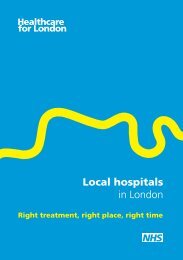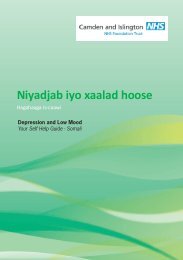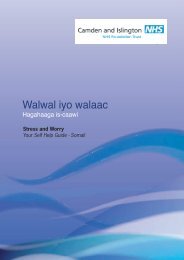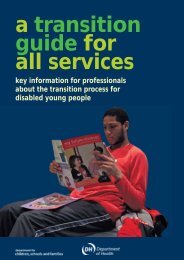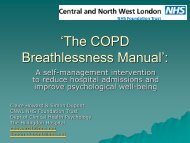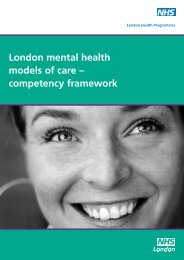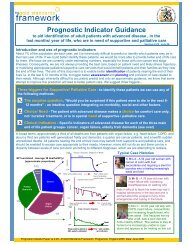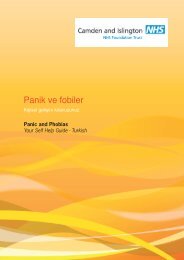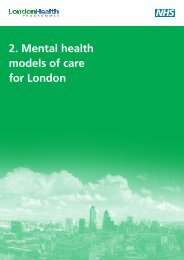NCEPOD: Trauma - Who Cares? - London Health Programmes
NCEPOD: Trauma - Who Cares? - London Health Programmes
NCEPOD: Trauma - Who Cares? - London Health Programmes
You also want an ePaper? Increase the reach of your titles
YUMPU automatically turns print PDFs into web optimized ePapers that Google loves.
5Hospital receptionRecommendationsAmbulance trusts and emergency departments shouldhave clear guidelines for the use of pre-alerts in theseverely injured patient population. The ambulancecrew should be able to speak directly to clinical staffin the receiving emergency department to ensure anappropriate clinical response is available immediately.(Ambulance trusts and emergency departments)Trusts should ensure that a trauma team is available 24hours a day, seven days a week. This is an essential partof an organised trauma response system. (Hospital trusts)Hospital and ambulance trusts should ensure there areagreed explicit criteria for issuing a pre-alert activation ofthe trauma team. (Hospital and ambulance trusts)A consultant must be the team leader for the managementof the severely injured patient. There should be no reasonfor this not to happen during the normal working week.Trusts and consultants should work together to providejob plans that will lead to better consultant presence in theemergency department at all times to provide more uniformconsultant leadership for all severely injured patients.(Hospital trusts and clinical directors)All patients should have a primary survey performed andclearly documented on admission to the emergencydepartment. (Emergency medicine physicians)Standardised documentation for the trauma patientshould be developed. This will improve patient careand multidisciplinary communication. In addition,comparative audit will be facilitated. (RCS and College ofEmergency Medicine)As previously recommended, a consultant must be theteam leader for the management of the severely injuredpatient. However, it is appreciated that this will not beachievable immediately. In the absence of this standardall severely injured patients should be reviewed by aconsultant as soon as possible; ideally this should bewithin four hours of arrival at hospital, but must be within12 hours of arrival. (Hospital trusts)References1. The Royal College of Surgeons of England and theBritish Orthopaedic Society. Better Care for the SeverelyInjured. 20002. Kazemi AR, Nayeem N. The existence and compositionof trauma teams in the UK. Injury 1997; 28:119-213. Brooks A, Williams J, Butcher W, Ryan J. GeneralSurgeons and <strong>Trauma</strong>. A questionnaire survey of GeneralSurgeons training in ATLS and involvement in the traumateam. Injury 2003; 34(7):484-64. Yates DW, Woodford M, Hollis S. Preliminary analysis ofthe care of injured patients in 33 British hospitals: fi rstreport of the United Kingdom major trauma outcomestudy. BMJ 1992; 305(6856):737-405. Porter JM, Ursic C. <strong>Trauma</strong> attending in the resuscitationroom: does it affect outcome? Am Surg 2001;67(7):611-461







